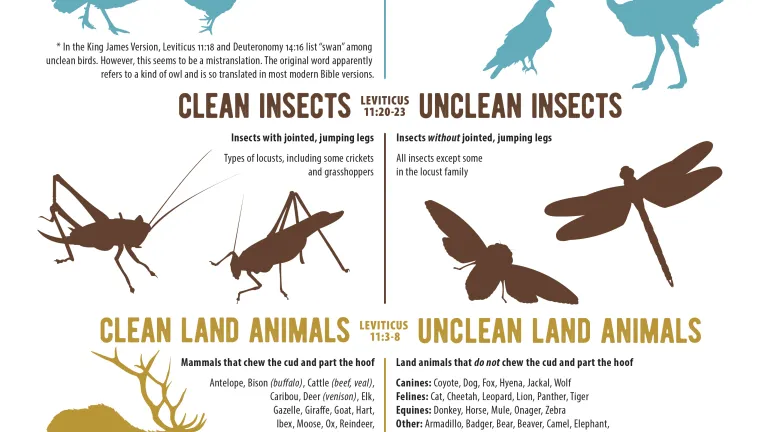Deuteronomy 14
No pagan rituals, clean and unclean meat, second and third tithe
Laws Still in Force
In this chapter, Moses reminds the Israelites about proper and improper mourning for the dead, about the consumption of clean versus unclean animals, and about tithing. All the laws discussed in this chapter are still valid for us today, with two exceptions.
When a close friend or relative dies, we are not to follow the ways of the heathen by "cutting" ourselves in mourning and despair, as ancient pagans and certain American Indian tribes did, nor by shaving the front of our head (verse 1). The reason is given in verse 2: We are a holy people to God, and as such we are to abstain from all religious practices dedicated to pagan gods or the dead, who were believed to live on in another life.
Further, we are to abstain from eating any unclean animal (verses 3-21), which is a "detestable" or "abominable thing" when used as food. Though the only land animals specifically identified in this chapter as unclean for food are the camel, the rabbit, the rock hyrax and the pig, the general description of unclean land animals is given as all that fail to meet the criteria of both chewing the cud and having cloven hooves (verses 7-8). Thus, all reptiles and amphibians are unclean, as are worms, spiders and most insects. So too are most mammals, the only ones acceptable for food being most of the ruminants, such as bovines, antelope, deer, sheep, goats and, though not always thought of, giraffe. In addition, only those water creatures "that have fins and scales" may be eaten (verses 9-10), thus ruling out things like eels, sharks, catfish, clams, squid, lobster, crab, shrimp and all other shellfish.
Clean birds may be eaten (verses 11, 20)—but these are only indirectly defined by listing unclean birds that must not be eaten (verses 12-18). From this list, we can see which birds are clean by noticing the characteristics of the birds which are unclean: (1) a clean bird has a craw or crop; (2) a clean bird has a gizzard with a double lining which can be easily separated; (3) a clean bird is not a bird of prey; (4) a clean bird does not devour food while flying; (5) a clean bird's hind toe and middle front toe are both elongated; (6) when a clean bird stands on a perch, it spreads its toes so that three front ones are on one side of the perch and the hind toe on the opposite side. All unclean birds lack at least one of these six characteristics. This means that the following birds are clean among others: chicken, turkey, duck, goose, swan, pheasant, quail, partridge, dove (pigeon), and all songbirds. While the King James Version says the "swan" is unclean in Deuteronomy 14:16 and Leviticus 11:18, the New King James and other modern versions correctly translate the word here as referring to a kind of owl. Birds like owls, hawks and ostriches are unclean—and so are their eggs.
Verse 19 tells us that all creeping or swarming things are unclean. Yet Leviticus 11, the parallel passage to this one, clarifies that certain kinds of flying insects with jointed legs above the feet for leaping may be eaten, e.g., locusts, grasshoppers and crickets (verses 21-22). It is believed that in the ancient Middle East, these insects were ground into a fine meal and baked into cakes—perhaps explaining the later description of John the Baptist's eating locusts with honey (Matthew 3:4).
In verse 21 of Deuteronomy 14, the Israelites were permitted to give aliens the meat of animals that died of themselves. However, there is no indication that unclean animals were allowed to be eaten by anyone. Therefore, the prohibition for Israelites in verse 21 to eat meat of animals that died of themselves and the permission to give it to foreigners for consumption deals with only clean animals. This was, therefore, a ritual law—a point made even clearer by the fact that an Israelite who did inadvertently eat of an animal that had died of itself became ritually clean again in the evening after washing himself with water (Leviticus 17:15; compare 11:39-40). We do not read anywhere, however, that the eating of an unclean animal brought only ritual uncleanness that ended in the evening after washing. Also, this ritual law against eating animals that have died of themselves is not to be confused with another law that is still very much in effect—God's prohibition against eating the blood of any animal (Deuteronomy 12:16, 23-25), which outlaws "strangled" clean animals from being eaten (Acts 15:29; 21:25).
Another ritual law mentioned in Deuteronomy 14:8 prohibits the touching of a dead pig's carcass. Leviticus 11 explains that touching the carcass of any unclean animal made a person ritually unclean, but only "until evening" (verses 8, 11, 24, 26, 27, 31). Indeed, the same was true for touching a dead clean animal (verse 39). The fact that a person became ritually clean again by evening, after washing himself, shows the ritualistic character of this provision. (This is not to say, however, that there were not health benefits to following even these ritual laws. For instance, an animal that died of itself may have fallen victim to a disease, thus making it potentially harmful to eat. And it remains a good practice to wash our hands after we have touched a dead animal of any kind to prevent the possible transmission of harmful pathogens. This is especially apparent when reading about how various pots and utensils were made unclean by the carcasses of dead animals in Leviticus 11.)
(To learn more about the dietary laws God gave, download or request our free booklet What Does the Bible Teach About Clean and Unclean Meats?)
Second and Third Tithes
Finally, Deuteronomy 14:22-29 discusses some tithing principles that are still valid today. This passage does not address the first tithe, which was to be given to the Levites for their work (compare Numbers 18:21). Some have argued that the tithe mentioned in Deuteronomy 14:22 is the first tithe. Yet, if that were the case, it would be the only tithe mentioned here without an explanation for its use. It makes more sense that the use of the tithe mentioned in verse 22 is spelled out in the verses that follow (verses 23-26)—and these verses clearly refer to a second tithe, which is to be used by the tithe-payer for himself and his family in the observance of God's feasts. Then follows a brief mention of a third tithe, saved only every third year out of a seven-year sabbatical cycle (verses 28-29; compare 26:12; Leviticus 25:2-4) to be given to the poor—i.e., the Levite (who was not allowed to own any land), the stranger, the fatherless and the widow. All three tithes are attested to by the well-known first-century Jewish historian, Flavius Josephus (compare Antiquities of the Jews, Book 4, chap. 4, secs. 3-4; chap. 8, secs. 8, 22).
(For more information on tithing and our responsibility in the matter, download or request our free booklet What Does the Bible Teach About Tithing?)





Beyond Today Bible Commentary: Deuteronomy